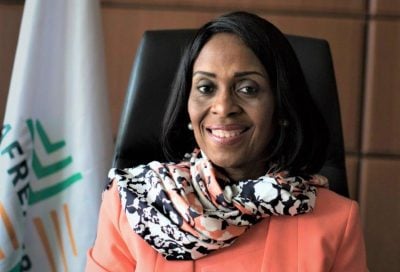The three-day Africa Climate Summit concluded in Nairobi last night with a call for global investors to enable the continent to unleash its potential as a green energy powerhouse.
The Nairobi Declaration on Climate Change, adopted at the end of the summit, sets a target to increase Africa’s renewable energy generation capacity to 300 GW by 2030 – up from just 56 GW in 2022. This will require an estimated $600bn – a tenfold increase in current levels of investment.
“Unlocking Africa’s climate positive growth potential on a scale that can contribute meaningfully to decarbonisation of the global economy will require several multiples of the current development and investment finance flows,” the declaration reads.
Twenty African heads of state or government were present at the conference, along with UN secretary-general António Guterres, European Commission president Ursula von der Leyen and the US president’s special envoy for climate, John Kerry. The summit proved to be an opportunity to help frame the continent’s negotiating position ahead of COP28, which will be held in Dubai from 30 November to 12 December.
The summit marked the first time the African continent has come together specifically to consider how to tackle the climate crisis. “This declaration will serve as a basis for Africa’s common position in the global climate change process,” says the final statement.
Developed economies must honour promises
“The Nairobi declaration sends a strong signal to the international community: Africa is providing the leadership needed to keep our chances of staying below 1.5. Europe must now listen to and support these voices. The energy transition requires a fairer system and major investments,” said Laurence Tubiana, CEO of the European Climate Foundation in a statement.
African leaders are sharpening their demands for developed economies to fulfil climate finance promises made over the course of many years.
Leaders reiterated their calls for the commitment to provide $100bn in annual climate finance to developing countries to be implemented – the promise was first made at a Copenhagen climate change summit in 2009. Africa is also demanding that the “Loss and Damage” fund, agreed at last year’s COP as a way to support countries most vulnerable to the impacts of climate change, be swiftly made into a reality.
Additionally, a proposal for a global carbon tax on fossil fuel trading was included in the declaration, along with a suggestion for a tax on global financial transactions as a means of funding green solutions and a call for “a new global financing architecture that is responsive to Africa’s needs including debt restructuring and relief”.
The declaration called on multilateral development banks (MDBs) to increase concessional lending to poorer countries and for the “better deployment” of the IMF’s special drawing rights. Other proposals include measures to help indebted countries avoid default and the development of a new Global Climate Finance Charter by 2025.
“We expect nothing less than a fit-for-climate global financial system,” commented Ghana’s finance minister, Ken Ofori-Atta. “We need to make debt work, to normalise the integration of loss and damage funding through the MDB system, revolutionise how we manage risk, and generate new resources through guarantees and credit enhancement that can offset high capital costs for climate investments.”
Flurry of investments
The Nairobi Declaration points out that Africa has the potential to provide 40% of the world’s renewable energy resources. However, the continent has received only 2% of the $3 trillion invested in green energy globally over the past decade.
Multiple investors and governments did use the summit as a platform to announce green infrastructure projects. These pledges add up to $23bn, according to Kenya’s President William Ruto.
One of the most eye-catching announcements was the creation of a new public-private partnership that will aim to bring grid electricity, supplied by run-of-the-river hydropower, to 70% of Burundi’s population by 2030. Only 12% of the country’s population currently has electricity access.
The newly formed company, Weza Power, is a partnership between the Burundian government and Virunga Power, a company that develops and operates electricity infrastructure. Gridworks Development Partners – an electricity distribution and transmission company owned by the UK’s development finance institution, British International Investment – holds a majority stake in Virunga Power.
An initial $60m investment is set to connect 300,000 people in Burundi to the grid. The partners aim to then raise $1.4bn for improved electricity distribution infrastructure to connect the majority of the country’s population.
“This is an important milestone for Burundi and a catalyst for accelerating electrification more broadly in sub-Saharan Africa,” Brian Kelly, CEO of Virunga Power, said in a statement. He added that Africa has lacked a locally-based model to blend public and private sources of capital in power distribution.
In a separate announcement mini-grid developer Husk Power revealed a plan to mobilise $500m for investment in 2,500 mini-grids on the continent. The company says this will benefit 7.7m people, while avoiding 2.1 megatons of CO2 emissions through displacing diesel generators.
Meanwhile, Kenya unveiled its Green Hydrogen Strategy and Roadmap, with a promise of €12m ($12.9m) in funding from the European Union. French company HDF Energy announced development studies are underway to construct Kenya’s first green hydrogen power plant at a cost of $500m. The facility will initially combine a 180 MW solar farm with 500 MWh of hydrogen-based storage.
However, while discussions included the role of Africa’s key mineral resources in economic transformation for the continent, the final declaration does not specifically position them in the new vision for green growth.
Carbon markets
Another large – but much more controversial – pledge came from a consortium of investors based in the UAE, which made a non-binding promise to purchase $450m in carbon credits via the African Carbon Markets Initiative (ACMI) by 2030. The ACMI was launched at COP27 last year with the aim of scaling the voluntary carbon market on the continent.
Announcing the investment, Sheikha Shamma bint Sultan bin Khalifa Al Nahyan, CEO of the investment vehicle known as the UAE Independent Climate Change Accelerators, described carbon markets as “a pivotal tool in our decarbonisation journey”.
Purchasing such a large volume of carbon credits will “not only help to unlock Africa’s carbon credit generation potential, but also supports sustainable investment opportunities and long-term climate impact,” she said.
However, many NGOs are sceptical. A report published at the start of the summit by a coalition of non-profit groups led by Power Shift Africa warned that the ACMI is a “dangerous distraction” from other climate priorities. The report states that the ACMI’s targets for the growth of the carbon market would lead to additional emissions of up to 2.5 gigatonnes by 2050 – more than double sub-Saharan Africa’s total level of current emissions.
“They are wasting money that should be spent on real solutions. Carbon credits are really ‘pollution permits’ and they help rich polluting companies avoid making actual cuts in their own emissions,” commented Mohamed Adow, founding director of Power Shift Africa.
Time for action
While the debate on the merits of the carbon market will continue, almost everyone can agree on one thing – that time is running out for meaningful action.
“Climate change is the single greatest challenge facing humanity and the single biggest threat to all life on Earth,” says the Nairobi Declaration. “It demands urgent and concerted action from all nations to lower emissions and reduce the concentration of greenhouse gases in the atmosphere.”
Additional reporting by Charles Dietz.
Want to continue reading? Subscribe today.
You've read all your free articles for this month! Subscribe now to enjoy full access to our content.
Digital Monthly
£8.00 / month
Receive full unlimited access to our articles, opinions, podcasts and more.
Digital Yearly
£70.00 / year
Our best value offer - save £26 and gain access to all of our digital content for an entire year!

 Sign in with Google
Sign in with Google 



